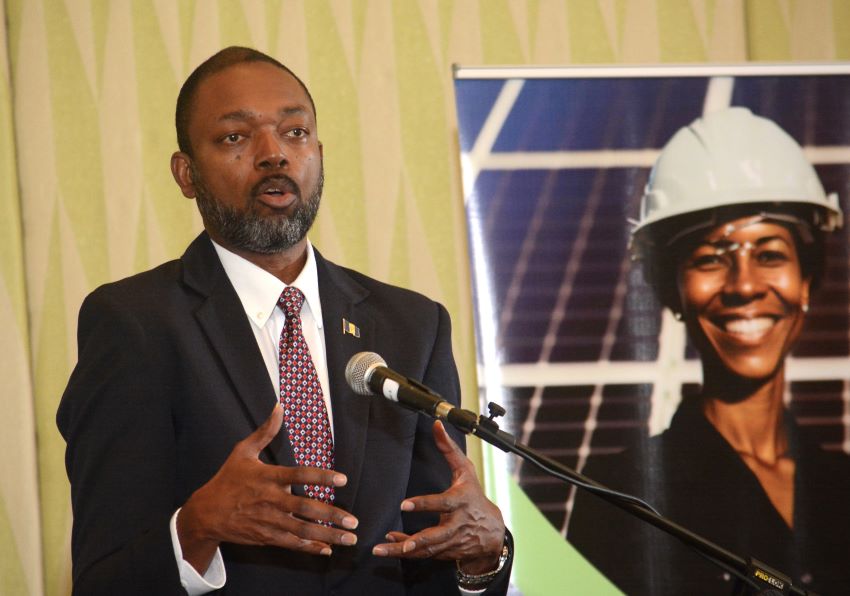
Barbados has been called on to determine how it can transition from relying on fossil fuel, as the basis of its economy, to a cleaner, sustainable economy that provides decent work for all.
Minister of Labour Social Security and Third Sector, Colin Jordan, made this appeal as he delivered the feature address at the opening of the National Symposium titled Just Transition and Job Creation in the Green and Blue Economy, hosted at Hilton Barbados, Needham’s Point St. Michael.
Emphasising the need to provide an answer, Mr. Jordan revealed that at a recent meeting of the ILO’s Governing Body in Geneva, he had sought to make it clear that the discussion on harnessing the fullest potential of rapidly evolving technology must be placed alongside addressing the climate crisis.
“I mentioned then the pressure being placed on our nations not to exploit any hydrocarbon resources within our states either land or marine boundaries. Now, we recognise that many developed states have achieved their development on the back of developing and/or use of fossil fuels. Recognising that if there is to be justice in the transition at all of its levels, then this issue must be addressed.”
The Minister also stated that he had referred to elements of the Bridgetown Initiative, which notes there must be access to reasonable, affordable finance for mitigation, adaptation and development, and there must be reasonable trading arrangements that allow for sustainable, people-centred development.
“I reiterate … my call for an ILO conversation/discussion that recognises the intersection between technological advancement and the climate crisis. Such discussion is in my view imperative,” he said.
Those present at the High-level Opening Session also heard that the Government of Barbados and its Social Partners had committed to the creation of a green and blue economy that would result in improved human well-being and social equity, while significantly reducing environmental risks and ecological scarcities.
“In the Declaration of Mission Barbados, we have agreed that by 2030, Barbados is to become a clean and beautiful large-ocean state, championing sustainable development locally and globally with the goal of all domestic activities becoming 100 per cent sustainable by 2035.
“All of us here today ought to see ourselves as leaders. All of us are innovators; all of us are potentially drivers behind one of the greatest transformations that our country has sought to undertake since we moved into a type of industrialisation phase in the 1970s,” stressed Minister Jordan.
Adding that the creation of a green and blue economy would be no small feat but a mammoth task, involving real, if not seismic change, he said: “It will not be business as usual. It will involve the creation and adoption of new technology.”
He also reminded the gathering that Prime Minister Mia Amor Mottley had called on Barbadians to become owners of this new technology, not just adopters and users.
Stating that this would not only call for transforming our work processes but also the way we think and live, he said: “All sectors will have to invest in new infrastructure. Education and training will also be critical, as the change will be people driven, requiring new knowledge and skills.”
